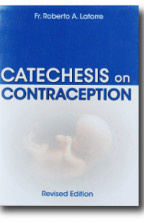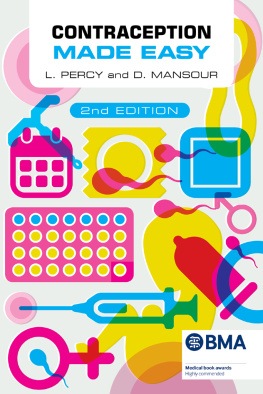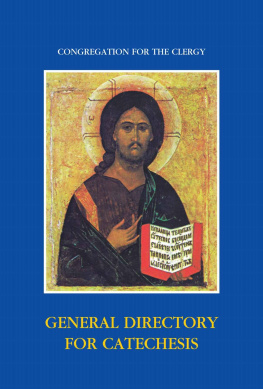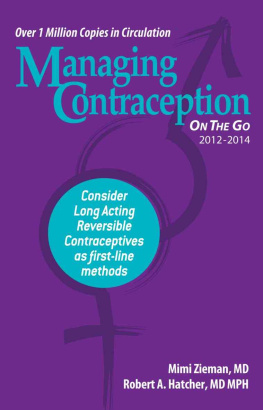Roberto Latorre - A Catechesis on Contraception
Here you can read online Roberto Latorre - A Catechesis on Contraception full text of the book (entire story) in english for free. Download pdf and epub, get meaning, cover and reviews about this ebook. year: 0, genre: Religion. Description of the work, (preface) as well as reviews are available. Best literature library LitArk.com created for fans of good reading and offers a wide selection of genres:
Romance novel
Science fiction
Adventure
Detective
Science
History
Home and family
Prose
Art
Politics
Computer
Non-fiction
Religion
Business
Children
Humor
Choose a favorite category and find really read worthwhile books. Enjoy immersion in the world of imagination, feel the emotions of the characters or learn something new for yourself, make an fascinating discovery.
- Book:A Catechesis on Contraception
- Author:
- Genre:
- Year:0
- Rating:3 / 5
- Favourites:Add to favourites
- Your mark:
- 60
- 1
- 2
- 3
- 4
- 5
A Catechesis on Contraception: summary, description and annotation
We offer to read an annotation, description, summary or preface (depends on what the author of the book "A Catechesis on Contraception" wrote himself). If you haven't found the necessary information about the book — write in the comments, we will try to find it.
A Catechesis on Contraception — read online for free the complete book (whole text) full work
Below is the text of the book, divided by pages. System saving the place of the last page read, allows you to conveniently read the book "A Catechesis on Contraception" online for free, without having to search again every time where you left off. Put a bookmark, and you can go to the page where you finished reading at any time.
Font size:
Interval:
Bookmark:
A CATECHESIS ONCONTRACEPTION
(2ndEdition)
By
Fr. Roberto A.Latorre
(printed version published byPaulines Publishing House, Pasay City , Philippines )
(original nihil obstat for firstedition from +Jaime Cardinal L. Sin)
ISBN 971-590-047-X
Digital Edition by permission ofauthor
Table of Contents
In1968, Pope Paul VI upheld the teaching, for many centuries maintained by allChristians, that contraceptive practice was a grave moral evil. He issued the encyclical letter HumanaeVitae (HV) (On the Transmission of Human Life) aware of the seriousopposition it would meet up with in a highly secularized world. Some other Christian communities had alreadybent over secularizing pressures and had publicly announced its change of moralposition. Many Catholics, including a group of experts that the Pope hadconsulted, recommended and expected that the Pope would follow suit. But he did not.
As theVicar of Christ on earth, with the responsibility incumbent on the successor ofSt. Peter, Pope Paul VI, as other Popes had done in the past on similar moraland doctrinal issues, had to uphold the moral truth that each and everymarriage act must be open to life.(HV, 11) At that time, Pope Paul VI seemed like a lonevoice crying in the wilderness (Mc 1:3) in the climate of sensuality andhedonism that was being spread by the so-called sexual revolution.
Indeed,the years that have passed since Humanae Vitae have coincided with thegeneral breakdown in morals associated with the sexual revolution. This revolution has made steady progress, fromthe free love practiced by isolated hippie communities in the nineteen sixties,to the ongoing gay movement seeking to normalize homosexual"marriages" and to the different social engineering attempts tolegislate sexual promiscuity. At present, the sexual revolution is taking atoll on human society in the form of increase in pornography, promiscuity,marital infidelity, divorce, abortion, sexually transmitted disease, andunhappiness in general.
We arewitnessing a progressive reversal of values in the fields of human sexualityand family life. The true experience of love is confused with lust. If a childis born out of wedlock, he is called a "love child"; and the childwho is a product of the conjugal love of spouses, in contraceptive mentalityfashion, is considered a "mistake." Sex is treated as a plaything, anobject of recreation, engaged in for pure pleasure. It is something casual;commitments destroy its fun.
PopePaul VI somehow foresaw this revolution when he warned us of the negativeeffects of the widespread use of contraception. He saw that contraception wouldbe the cutting edge of the "general lowering of morality." (HV, 14)In retrospect, we can now see that the distortion of sexual values is a directconsequence of the distortion of conjugal love linked to contraceptivepractice. Paul VI even foresaw how some governments (public Authorities whotake no heed of moral exigencies) can abuse their power and tyrannicallydictate the behavior of citizens because of contraception. (See HV, 17)
St. Paul 's description of the moralsituation of pagan antiquity in Rom 3:24-32, is reminiscent of our owntimes. Yet the early Christians, likeleaven in the mass of society, were able to transform society through the powerof the doctrine of Christ and the Church, which they lived and practiced withconsistency. Causes for optimism are thepositive response among Catholics to the clarifications and teachings on lifeand sexual morality from the successors of Paul VI, most notably from theprolific writings and speeches of the late Pope John Paul II on the theologyof the body. Furthermore, confusionamong some Catholics, though still present, has been amply addressed by suchauthoritative sources as the Catechism of the Catholic Church (CCC), theApostolic Exhortation about the family Familiaris Consortio (FC) and theencyclical Evangelium Vitae.
We hopethat this brief exposition of the Church's teaching on contraception can be ofhelp to Catholics who want to put their faith into practice and help in theChristian transformation of our society. The contraception issue hasramifications in many other fields as well. We have limited this exposition tothe strictly religious and moral aspects of the issue, with the conviction thatthe Author of the moral law is also the Creator of the universe and the Lord ofsociety, and He cannot contradict Himself.
Contraceptionis any action which either before, atthe moment of, or after sexual intercourse, is specifically intended to preventprocreationwhether as an end or as a means. (HV, 14) "Contraceptives" are any device or drug used for contraception.Examples of contraceptive actions are the practice of withdrawal, the use ofcondoms and spermicides. The Intrauterine Device (IUD) and many contraceptivepills and injectibles are also called contraceptives, but in a high percentageof cases, they actually prevent births by expelling the developing human beingalready conceived. They are thus properly called "abortifacients"(i.e., they cause abortion). Abortifacients are even more immoral than truecontraceptives, because their use violates the Fifth Commandment of God,"Thou shall not kill," showing a disregard for the value of humanlife.
Closely related to contraception is sterilization,such as tubal ligation in females and vasectomy in males. Sterilization is a procedure wherein a personis rendered permanently or temporarily infertile. Sterilization is considered a form ofmutilation.
It isimmoral to practice contraception because it goes against the natural moral lawand the true good of human persons in marriage. It is a serious moral disorder and objectively constitutes a grave sin thatgoes against the virtue of chastity. As such, the Church has constantly opposedit.
Contraceptionis a practice that is immoral for all men because it goes against the naturalmoral law. Natural law is based on human nature and on God's plan for the goodof mankind and is therefore applicable to all men no matter what religion theyprofess.
The natural moral law, unlike the "law of thegospel" or ecclesiastical law, is binding on all men and not only onChristians or Catholics. In declaring the immorality of contraception, theChurch is not imposing her own internal discipline. She is simply fulfillingthe role given her by Christ, to be "guardian and authenticinterpreter" of the natural law (see HV, 4), whose author is the Creatorof all men.
Contraception,as an act of spouses to engage in sexual intercourse while deliberatelyimpeding its openness or orientation to the transmission of new life, goesagainst the very purpose and intimate structure of the conjugal act. In so doing, the contracepting spousesprimarily go against the virtue of conjugal chastity (related to the SixthCommandment of the Ten Commandments).
There are other virtues and values that can beundermined by the practice of contraception. Contracepting persons can also go against value of life, may arrogate tothemselves a power that belongs solely to God and may distort the communicationof spousal love in their language of the body. In terms of the TenCommandments (which are expressions of the natural law), these are contrary aswell to the Fifth, First, and Eighth Commandments.
"Marriageand married love are by nature ordered to the procreation and education ofchildren."(
Font size:
Interval:
Bookmark:
Similar books «A Catechesis on Contraception»
Look at similar books to A Catechesis on Contraception. We have selected literature similar in name and meaning in the hope of providing readers with more options to find new, interesting, not yet read works.
Discussion, reviews of the book A Catechesis on Contraception and just readers' own opinions. Leave your comments, write what you think about the work, its meaning or the main characters. Specify what exactly you liked and what you didn't like, and why you think so.










